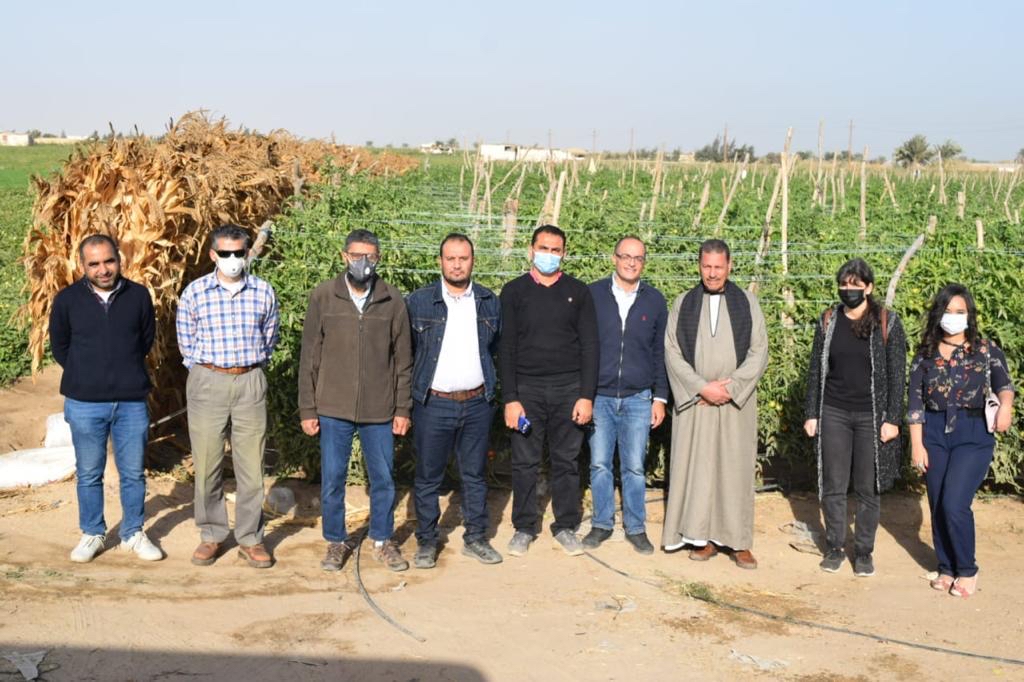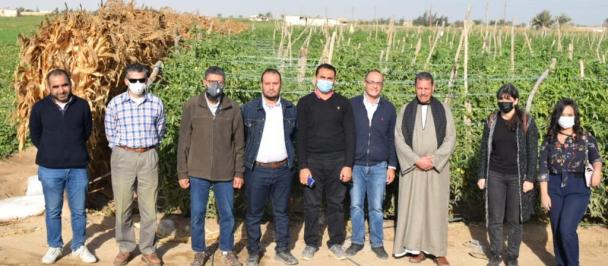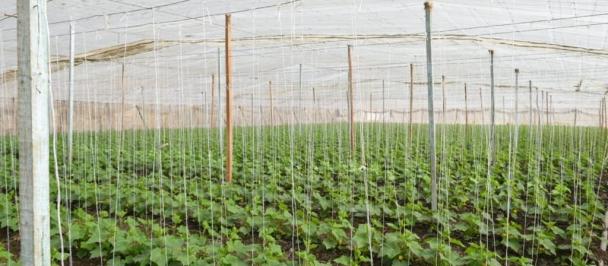Scoping out the needs of Egypt’s smallholders and the future wanted to be seen by 2050
July 22, 2022

UNDP’s Accelerator Lab in Egypt is all about seeking innovative adaptations and workable solutions that we can help scale up rapidly to meet development challenges.
The adverse impacts of climate change on agriculture are manifold, with droughts, heatwaves and rising sea-levels leading to reduced yields and lower-quality crops, soil salinity, plant diseases and pests. At the same time, unsustainable farming methods also contribute significantly to climate change, including the over-use of water, pesticides, and fertilizers, as well as the planting of inappropriate crops. This is why farmers and experts around the world are striving for ways to adapt agriculture in the face of growing global food insecurity.
Farming communities living and working in the low-lying fields of the Nile Delta are among the most vulnerable to these negative impacts, especially to rising sea-levels and consequent soil salinity. Many of these farmers are smallholders facing severe financial hardship and precarity.
UNDP’s Accelerator Lab in Egypt is all about seeking innovative adaptations and workable solutions that we can help scale up rapidly to meet development challenges. To ensure these solutions are sustainable, we make sure to listen closely to the communities most affected and look out for ‘signals’ to inform the best plan of action.
As part of UNDP’s ongoing efforts to support farming communities on the Delta, therefore, the Lab team partnered with some smart young Egyptians to find out about the greatest challenges farmers face, the future they most hope for, and the changes needed to turn that future into reality by the year 2050, through interviewing representatives of agribusinesses in the region and experts from relevant NGOs.
From these interviews and consultations, we noted the following “signals of change” as the basis for prioritizing future actions:
Environmental Signals of Change
The main emerging signals of change in the environment of the Delta are climate related. These include seawater intrusion and salinity due to rising sea-levels, increased flooding, droughts, heatwaves, and higher levels of CO2. In addition, new plant diseases were identified, including the spread of fungal diseases.
Technological Signals of Change
Positive signals of technological change were identified in the emergence of ‘smart agriculture’ in some areas, i.e. data-controlled agriculture using AI technology, robots and sensors. These technological advances include carbon-capture technologies, vertical farming, the use of solar energy, IOT, soilless farming systems such as hydroponics, aquaponics and aeroponics, change from flood irrigation to drip irrigation, and expanding e-markets for farmers. The growth of research and development in agriculture was also identified as an important positive signal.
Economic Signals of Change
Negative economic signals of change include scarcity of resources, lack of subsidies, and the economic consequences of the pandemic. Positive economic signals include the growth of a circular economy, an increasing number of agribusinesses – especially in contract farming and the microfinancing of small farmers – as well as an increase in development projects aimed at strengthening rural agribusiness.
Societal Signals of Change
The negative social signals of change identified in our interviews and consultations included population growth and migration to towns and cities. On the positive side, there is a growing interest among consumers in organic farming and veganism, increased empowerment among women, a growth in urban farming and desert farming, emerging agriculture tourism, and the introduction of new techniques learnt through social interactions.
We asked them the following question: “Which possible future would you prefer to see for Delta smallholders by 2050?
The futures envisaged for the farmers can be summarized as follows:
In 2050, smallholders on the Delta will be well aware of climate change and effective ways to adapt. They will be aware of resource management and how efficient management can help increase their profits. They will be an important part of the supply chain and will be able to supply big factories and trace their products through blockchain technology. They will have access to finance, technology and information resources. They will be using smart agriculture and organic farming to grow ‘smart’ sustainable crops.
In this scenario, society at large is more supportive of farmers. Cooperatives are back on the scene. The quality of agricultural education is high. Farming villages have good infrastructure. Consultants and mentors are available to coach farmers. Access to water is no longer problematic.
What actions and changes are needed to turn this future into reality?
At market-level
- More supply-chain analysis by industries
- Development of suppliers
- More local sourcing and reduced imports
- More regulations, and incentives to encourage farmers and society to change consumption and production behaviour
- The production of new ‘climate smart’ crops
- Auditing to ensure the market focuses on quality not quantity.
At the level of farmers
- Farmers need to start gaining more knowledge and trying to find resources to learn new techniques, including through the use of smartphones and other digital tools.
- Farmers need to learn how to manage their resources, to research new crops, to manage water more efficiently and to learn more about how supply chains work.
At policy-level
- More public projects to help raise awareness and provide consultancy for farmers.
- Data-collection to restructure agricultural subsidies
- More support for R&D in agriculture
- Better agricultural education for farmers and students
- Improved anticipation of changes in temperature to reallocate lands and crops
- Crops analytics and water-management policies.
- Localization of technology
- More agricultural research centres
- Stronger monitoring, reporting and evaluation
- Improved facilitation of loans processes and debt-rescheduling
Civil Society Level
- More awareness-raising projects
- Innovative and eco-friendly solutions through learning from other countries’ experiences
- Improved financing for farmers
- Capacity-building for farmers
- Support for connecting smallholders to markets
- Greater respect and protection for farmers, including their depiction in the media.
Interested in more details about our work and initiatives? Get in touch at comm.eg@undp.org.
In 2050, smallholders on the Delta will be well aware of climate change and effective ways to adapt. They will be aware of resource management and how efficient management can help increase their profits. They will be an important part of the supply chain and will be able to supply big factories and trace their products through blockchain technology.

 Locations
Locations

